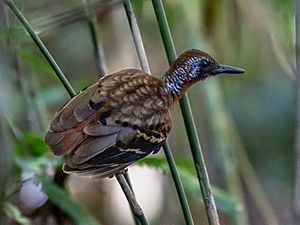Wing-banded Antbird facts for kids
Quick facts for kids Wing-banded Antbird |
|
|---|---|
 |
|
| Conservation status | |
| Scientific classification | |
| Kingdom: | |
| Phylum: | |
| Class: | |
| Order: | |
| Family: | |
| Genus: |
Myrmornis
Hermann, 1783
|
| Species: |
M. torquata
|
| Binomial name | |
| Myrmornis torquata (Boddaert, 1783)
|
|
The wing-banded antbird (Myrmornis torquata) is a special kind of bird. It belongs to a group of birds called antbirds, which are known for eating insects. This bird gets its name from the cool stripe, or "band," on its wings!
You can find the wing-banded antbird in many countries in Central and South America. These include Brazil, Colombia, Ecuador, French Guiana, Guyana, Nicaragua, Panama, Peru, Suriname, and Venezuela. They live in the thick rainforests of these areas.
Contents
What Does the Wing-banded Antbird Eat?
The wing-banded antbird is a very interesting eater. It spends most of its time on the ground, searching for food. It looks for insects hidden under dead leaves.
How Does It Find Food?
This bird has a clever way of finding its meals. It hops around on the forest floor. When it finds a pile of dead leaves, it uses its long beak to flip them over. This helps it find the insects and other small creatures hiding underneath. It's important to know that it doesn't pick up the leaves with its beak. Instead, it just turns them over to see what's there.
Where Does the Wing-banded Antbird Live?
The wing-banded antbird makes its home in the dense, wet tropical forests. These forests are usually found in low-lying areas. They prefer places with lots of trees and plants that provide good cover.
Its Habitat in the Rainforest
The rainforest is a perfect home for these birds. It offers plenty of insects to eat and many places to hide from predators. They are often found in the undergrowth, which is the layer of plants and bushes close to the ground. This helps them stay hidden while they search for food.
Is the Wing-banded Antbird in Danger?
The wing-banded antbird is currently listed as a species of "Least Concern" by the International Union for Conservation of Nature (IUCN). This means that, for now, its population is stable and not facing a high risk of becoming extinct.
Why Conservation Matters
Even though it's not in immediate danger, it's always important to protect rainforest habitats. These forests are home to many unique animals, including the wing-banded antbird. Protecting their homes helps make sure these amazing birds can continue to thrive for many years to come.
See also
 In Spanish: Hormiguero alifranjeado para niños
In Spanish: Hormiguero alifranjeado para niños
 | Jewel Prestage |
 | Ella Baker |
 | Fannie Lou Hamer |


